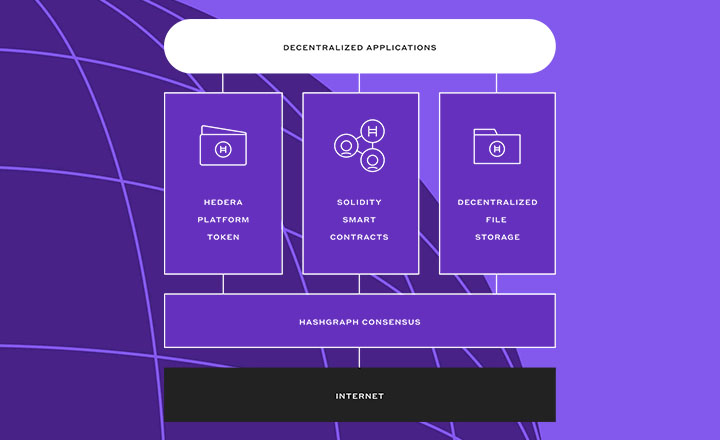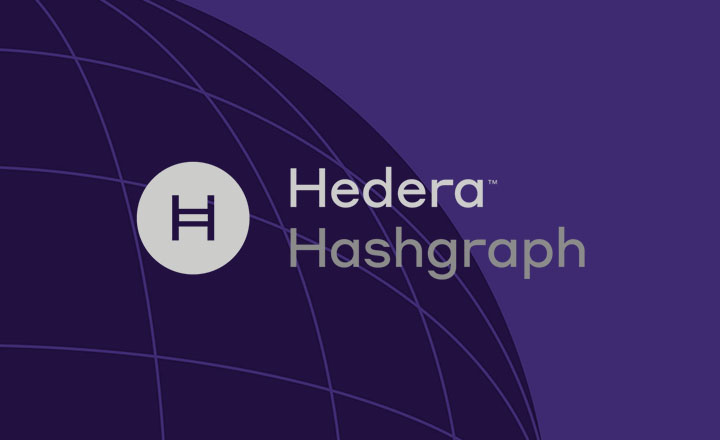Hedera Hashgraph is a public distributed ledger platform using the hashgraph algorithm that aims to become a better alternative to blockchain technology.
Hedera Hashgraph is a public distributed ledger platform. It uses the hashgraph algorithm invented by one of its founders, Leemon Baird. Created in 2017 by Baird and Mance Harmon, Hedera aims to provide a faster and more secure alternative to blockchain technology.
The network uses the hashgraph consensus algorithm, which Hedera claims to be faster and more efficient than what most decentralized networks utilize. Hashgraph, according to Hedera, uses powerful mathematical guarantees like the Byzantine agreement and fairness whereas blockchain does not.
Recently, Hedera has raised over US$100 million dollars from institutional investors through the sale of future HBAR tokens. The mainnet went live in late August and produced 50 billion HBAR.
How Hedera Solves Obstacles to DLT Adoption
There are obstacles hindering the widespread adoption of distributed ledger technology (DLT). Hedera believes that its platform can provide a solution to DLT’s problems and pave the way to mainstream acceptance.
- Process Transactions Faster. Most networks take a lot of time to complete a huge volume of transactions. Meanwhile, Hedera’s hashgraph algorithm can process a great number of transactions per second with efficiency.
- Tighten Network Security. Networks involved in valuable transactions are more prone to attacks. To combat this, most networks give off their decentralized nature for tighter security, and vice versa. Hedera’s platform maximizes both attributes without having to trade off one for the other. The network is not only asynchronous Byzantine Fault Tolerant (aBFT), but it is also resistant to both Sybil attacks and Distributed Denial of Service (DDOS) attacks.
- Implement Governance and Consensus Models. A number of platforms are too centralized that the future of the network rests at the whim of a single party. On the other hand, total decentralization would mean that the network could be led astray without a guiding leader.For these reasons, Hedera went for the middle ground. In its system, a diverse governing council makes macro decisions concerning the future of the platform. Meanwhile, the order of transactions in the network is decided through a consensus of the nodes.
- Stabilize Network. Platforms are also prone to sudden forks triggered by dissidents and malicious attackers alike, making these networks unstable. As a countermeasure, Hedera has placed technical controls on the network and legal controls on the governing body to prevent a split of the network and to keep the platform stable.
Hedera’s Services
 As of the moment, access to Hedera’s mainnet is limited only to a number of developers and testers. As a result, only they can witness in person Hedera’s services before the mainnet goes public six months later.
As of the moment, access to Hedera’s mainnet is limited only to a number of developers and testers. As a result, only they can witness in person Hedera’s services before the mainnet goes public six months later.
- Smart Contracts. The platform can run smart contracts written in the programming language Solidity. These codes can be transferred from another platform to Hedera, so long as the smart contract uses Solidity. This function allows developers to easily build distributed applications (dApps) on the Hedera network.
- Cryptocurrencies. Hedara also offers cryptocurrencies in the form of HBAR. The coin can be used to run smart contracts and to fund other transactions inside the network.
- File Storage. The platform also serves as data storage. Data could not be lost as every node contains the same stored information. However, those who have authorized access can revoke the stored data.
Fast and Cheap Transactions
Blockchain-based networks currently face the problem of scalability, wherein a network can handle only a small number of transactions at a given time. Hedera claims that it has the capability of handling thousands of transactions in just a second. Added to that assertion is Hedera’ efficiency, which makes transaction fees way cheaper.
As evident throughout the history of man, better technologies tend to replace outdated ones. Hedera presents itself as a better alternative to blockchain-based networks in terms of transaction speed and security. If Hedera succeeds in its goal of mainstream adoption, it is highly possible for the people of the future to enjoy the advantages of having a decentralized financial system, including cheap and borderless transactions.







